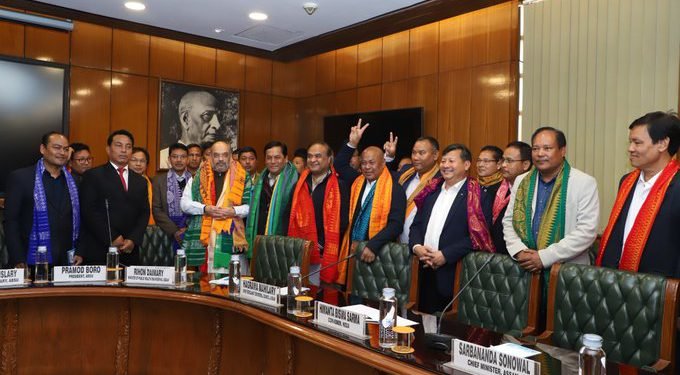
By: Anirban Choudhury*
Guwahati (Assam), Mar 17 : Plagued by years of violence, a new era of hope, peace and prosperity finally dawned in the volatile Bodoland area of Assam as a tripartite Bodo accord was reached among the Centre, Government of Assam and Bodo organisations in New Delhi on January 27. Termed as “historic” by many, this was in fact the third Bodo accord in the series – the first being signed in 1993 that led to formation of Bodoland Autonomous Council (BAC) and the second in 2003 that led to creation of Bodoland Territorial Council (BTC).
Signed by the All Bodo Students’ Union (ABSU), the United Bodo People’s Organisation (UBPO) and all the four factions of the National Democratic Front of Boroland (NDFB), the latest accord will upgrade the existing BTC by rechristening it as Bodoland Territorial Region (BTR) and vesting it with more executive, legislative and financial powers for the 40 departments it already controls. While eight new additional departments will be transferred to it, BTR will now even have a say in the appointments of Deputy Commissioners (DCs) and Superintendents of Police (SPs) in the four districts of Kokrajhar, Chirang, Baksa and Udalguri, though Dispur will still continue to control the Home and Police departments. Also, the number of seats in BTC will be increased from 40 to 60 even as it would no longer have to depend entirely on the Assam government for funds.
A satellite body to be christened Bodo-Kachari Autonomous Council will also be constituted for development of Bodo villages outside the BTR, even as Scheduled Tribe (Hills) status will be given to the Bodos living in the hill districts of Karbi Anglong and Dima Hasao. Further, a Central university, a national sports university, a North East Regional Institute of Medical Sciences and a National Institute of Technology will be set up in BTR as per the accord provisions.
The accord will hopefully mark the end of armed hostilities in the area as 1,615 cadres of the four NDFB factions formally laid down arms before Chief Minister Sarbananda Sonowal at a ceremony in Guwahati three days later, besides depositing 178 weapons and 4,803 ammunition’s.
Meanwhile, the latest Bodo accord can be seen as setting a new paradigm in ways more than one. While it’s too early to comment on how the situation ultimately evolves in BTAD in the days to come, the agreement could set a new benchmark in how the complex ethno-political issues in the Northeast are resolved. Be it the 16-Point Agreement of 1960 or the Shillong Accod of 1975, besides the two Bodo accords earlier, most peace deals in the region had fallen through in the past as not every group could be brought on board. However, this is for the first time that all factions of Bodo groups have together signed a peace deal. This has led to hope that this accord will withstand the test of time. And that New Delhi is expected to toe this line in resolving other pending issues in the Northeast can be gauged from the fact that it has made it amply clear to various Naga groups that there would be only one Naga accord, which everyone will have to sign.
However, the proof of the pudding is in the eating. While the first hurdle of reaching an agreement with all groups on board have been overcome, the challenge now lies in how these groups reconcile their differences and bitter rivalry, and co-opt each other as a team to serve the common man. Past events of bloody factional feuds don’t inspire much hope, though it would be unfair to be entirely dismissive of the new accord either. Similarly, there are non-Bodo communities who have their own grievances and resent too much power being concentrated on the Bodos. Thousands of lives have already been lost in ethnic clashes in the area in the past three decades. Further, other Scheduled Tribes (Hills) are opposed to the Bodos being granted the same status. Hence, maybe it’s perhaps too early to celebrate. Nonetheless, a new beginning has been made and it’s hoped that good sense will prevail on all stakeholders to usher in permanent peace.
* The writer is an independent journalist based in Guwahati










































